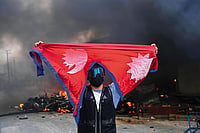In a significant development, the top brass of the Pakistan Army addressed the escalating wave of terrorist attacks, highlighting a crucial factor behind the surge. During the 258th Corps Commanders’ Conference led by Army chief General Asim Munir, the military leaders subtly pointed towards the Taliban-ruled Afghanistan as a neighboring country that harbors sanctuaries and provides sophisticated weaponry to the banned Tehreek-e-Taliban Pakistan (TTP) terrorists.
Cognizant of the security implications, the Pakistani military vowed unwavering support for the government's strategic initiatives aimed at revitalizing the nation's economy. They pledged to extend technical and management assistance to enhance the overall well-being of the Pakistani people, as PTI reported.
The Army's statement emphasized that the availability of sanctuaries and operational freedom for TTP terrorists and other similar groups in Afghanistan, along with the provision of advanced weaponry, were significant factors affecting Pakistan's security. Although the neighboring country was not explicitly mentioned, Pakistan had previously accused Afghanistan of tolerating the outlawed TTP on its soil.
Recent events have heightened tensions between the two nations. Pakistan's Defence Minister, Khwaja Asif, expressed frustration over Afghanistan's failure to fulfill its responsibilities as a neighboring and brotherly country. He criticized Afghanistan for disregarding the Doha agreement and allowing terrorists responsible for bloodshed in Pakistan to find refuge on Afghan soil. Asif stressed that Pakistan would utilize all available resources to protect its land and citizens from cross-border threats.
Furthermore, Army chief Gen Munir cautioned the Afghan Taliban about potential consequences if they continued harboring militants plotting attacks from Afghanistan. This warning came in response to the killing of 12 soldiers in separate terrorist incidents in Balochistan, marking the highest single-day toll of troops in the province. A lesser-known faction of the Pakistani Taliban claimed responsibility for these attacks.
Pakistan has witnessed a significant upsurge in TTP attacks since the Afghan Taliban assumed power in 2021. In light of this, the Army's meeting extensively discussed operational preparedness, training, and the prevailing internal security environment. The commanders received detailed briefings on these matters, emphasizing the importance of objective training to safeguard national security.
Moreover, the conference also highlighted the government's economic revival plan and the Army's role in uplifting various sectors, including agriculture, IT, mining and minerals, and defense production. These sectors fall under the purview of the Special Investment Facilitation Council (SIFC), which aims to bolster economic growth and development in Pakistan.





















